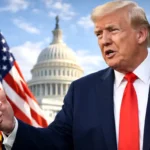Key Points
- Jay Clayton expects cryptocurrency legislation to be prioritized under Trump’s administration.
- Biden’s administration has been strict with crypto enforcement, while Trump’s team may offer more favorable policies.
- Clayton advocates reducing regulatory requirements to encourage companies to go public.
- Clayton is willing to accept a role in Trump’s administration if it aligns with his expertise.
On Wednesday, Jay Clayton, former Wall Street regulator and potential appointee in President-elect Donald Trump’s anticipated administration, indicated that Congress will likely enact cryptocurrency legislation. Speaking to securities lawyers in New York, Clayton expressed optimism that legislative action on cryptocurrencies could soon follow as the new administration seeks a more favorable environment for digital asset regulation. “I think we will see crypto legislation,” Clayton noted, adding that tackling certain regulatory issues at executive and administrative levels could simplify legislative efforts.
This potential legislative shift would represent a departure from the approach under President Joe Biden, whose administration has pursued strict enforcement actions against crypto companies and has largely resisted the regulatory frameworks requested by the industry. Clayton’s remarks suggest that the forthcoming administration might take a different stance, one that could bring the U.S. closer to providing the regulatory clarity that cryptocurrency advocates have sought.
In addition to his views on crypto regulation, Clayton emphasized the importance of reducing regulatory burdens to encourage companies to go public. Citing recent requirements by the Securities and Exchange Commission (SEC) for corporate disclosures on climate-related transition costs, Clayton argued that such regulations could deter companies from entering the public markets. “If you’re thinking about entering the public markets and you’re seeing that working its way through the system, you’re like, ‘Really? I gotta gather all this data that has nothing to do with how I run my business?'” Clayton remarked.
Clayton also mentioned recent U.S. Supreme Court decisions that limit executive powers, suggesting they should motivate regulators to assess whether current litigation and regulations remain justified. This could signal a push for a more restrained regulatory landscape, aligning with conservative perspectives that favor reducing governmental oversight of corporate activities.
Though Clayton declined to confirm any plans to join the Trump administration, he did not rule out the possibility. “If asked for a role where I could be effective, I’ll say yes,” he stated, hinting at potential involvement in regulatory or policy roles, including a possible appointment as Attorney General.
As speculation over Trump’s cabinet choices and regulatory strategies grows, Clayton’s comments reflect a broader shift anticipated by many in the financial sector. Industry players, who have invested heavily in recent elections, expect that Trump’s administration will push for fewer regulatory constraints, particularly in emerging industries such as cryptocurrency.




